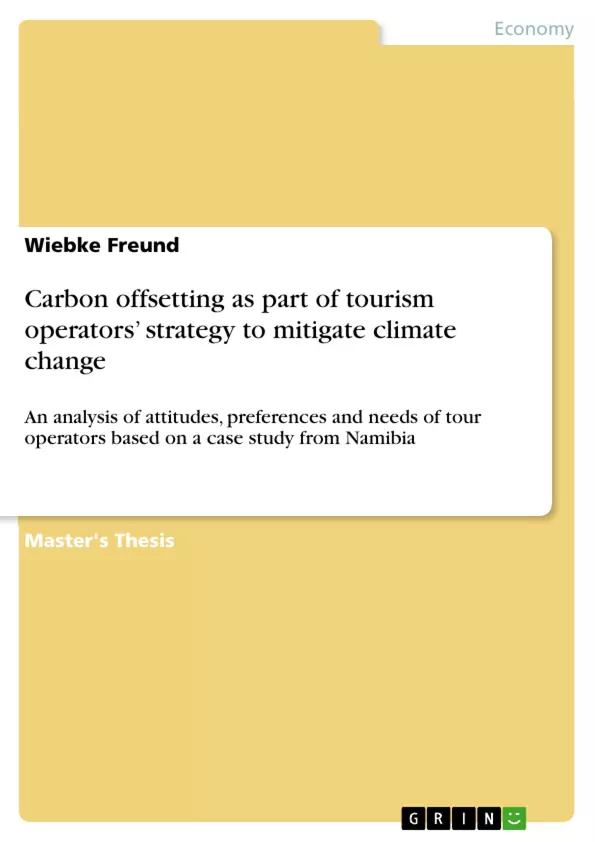This study is undertaken with the background that tourism is an active contributor to the man-made climate change and is also vulnerable to impacts of climate change. Apart from climate adaptation measures, the tourism industry needs to develop mitigation strategies to reduce its greenhouse gas emissions. Tour operators play the key role in climate protection measures in the tourism industry but may also face significant challenges due to climate change. This paper focuses on carbon offsetting as one tool of tour operators’ climate protection activities. Besides a literature analysis, empirical data was collected through qualitative interviews for this study. Two different surveys were undertaken: one with international tour operators that are already active in climate protection and one with tour operators in Namibia. The interviewed companies all used carbon offsetting by either managing an own project to compensate emissions or by cooperating with an offsetting agency. The choice seemed to be founded in each company’s capacity and resources as well as in their basic philosophy. Forestry projects as self-managed offsetting projects were clearly preferred. It was identified that pivotal factors for choosing forestry projects were accessibility for travel groups, tangibility for communication purposes and social benefits for local communities. Several companies indicated growing customer satisfaction or believed their climate commitment would positively influence their bookings. These outcomes were independently of the type of offsetting project the tour operators supported. The study further revealed that general factors for success in climate mitigation are not related to the size of a company, but rather its general commitment to sustainability, a strategic carbon management plan and transparent and comprehensive communication.
The second part of the paper comprises a case study from Namibia in which tour operators’ current awareness and perception of climate change are analysed. Additionally, tour operators’ knowledge and attitude towards carbon offsetting are studied. This study showed that tour operators were overall aware of potential threats for the tourism development in Namibia and considered climate change to become increasingly important in the future for the tourism industry. However, climate protection was not yet a high priority for the companies and only minor steps were taken to reduce carbon emissions.
Table of Contents
- Abstract
- Zusammenfassung
- Acknowledgement
- 1 Introduction
- 2 Climate Change and Tourism
- 2.1 Climate Change - A Global Challenge
- 2.2 Impacts of Climate Change on Tourism
- 2.3 Tourism as a Contributor to Climate Change
- 3 Climate Protection Strategies in the Tourism Industry
- 3.1 General Climate Protection Strategies
- 3.2 Carbon Offset as a Climate Protection Tool
- 4 Carbon Offset Projects - A Literature Analysis
- 4.1 The Concept of Carbon Offset
- 4.2 Types of Offset Projects
- 4.3 The Role of Tour Operators in Carbon Offset Projects
- 4.4 Criteria for Selection of Offset Projects
- 4.5 Criticism on Carbon Offsetting
- 5 Empirical Research on Tour Operators' Climate Protection Activities
- 5.1 Research Methodology
- 5.2 Results of the Interviews with International Tour Operators
- 5.2.1 Carbon Offset Projects of the Interviewed Companies
- 5.2.2 Reasons for Choosing Carbon Offset Projects
- 5.2.3 Benefits and Advantages of Carbon Offset Projects
- 5.2.4 Key Factors for Success
- 5.3 Results of the Interviews with Namibian Tour Operators
- 5.3.1 Tour Operators' Awareness of Climate Change
- 5.3.2 Climate Protection and Sustainability
- 5.3.3 Tour Operators' Knowledge of Carbon Offset
- 5.3.4 Attitudes and Preferences towards Offset Projects
- 6 Conclusion
- 7 References
- Appendix
Objectives and Key Themes
This study examines the role of carbon offsetting in tour operators' climate protection strategies. It investigates the attitudes, preferences, and needs of tour operators regarding carbon offsetting, focusing on both international and Namibian operators. The study aims to understand the factors influencing tour operators' decisions to engage in carbon offsetting and to identify the key challenges and opportunities associated with this approach.
- Climate change and its impacts on the tourism industry
- Climate protection strategies in the tourism industry, particularly carbon offsetting
- Factors influencing tour operators' decisions to engage in carbon offsetting
- Benefits and challenges associated with carbon offsetting projects
- Tour operators' awareness and perception of climate change in the context of Namibia
Chapter Summaries
Chapter 1 provides an introduction to the research topic, outlining the significance of climate change and its implications for the tourism industry. Chapter 2 delves into the multifaceted relationship between climate change and tourism, discussing the impacts of climate change on tourism destinations and the contribution of the tourism industry to climate change. Chapter 3 explores climate protection strategies in the tourism industry, focusing on the concept of carbon offsetting as a potential tool for mitigation. Chapter 4 presents a comprehensive literature analysis of carbon offset projects, examining different types of projects, the role of tour operators, and the criteria for selecting suitable offset projects. Chapter 5 presents the findings of the empirical research, based on interviews with both international and Namibian tour operators. The study analyzes tour operators' attitudes, preferences, and needs regarding carbon offsetting, as well as their awareness and perception of climate change. The chapter concludes with a discussion of the key factors for success in implementing climate protection strategies.
Keywords
The key terms and concepts explored in this study include climate change, tourism, carbon offsetting, climate protection strategies, tour operators, sustainable tourism, environmental sustainability, greenhouse gas emissions, mitigation, adaptation, Namibia, and sustainable development.
- Quote paper
- Wiebke Freund (Author), 2012, Carbon offsetting as part of tourism operators’ strategy to mitigate climate change, Munich, GRIN Verlag, https://www.grin.com/document/298440



